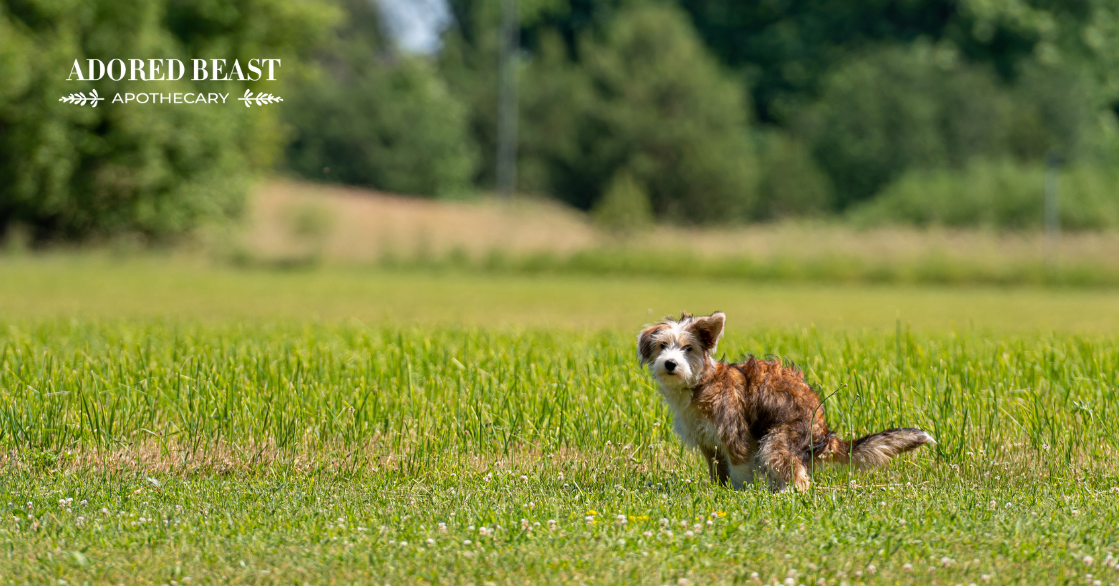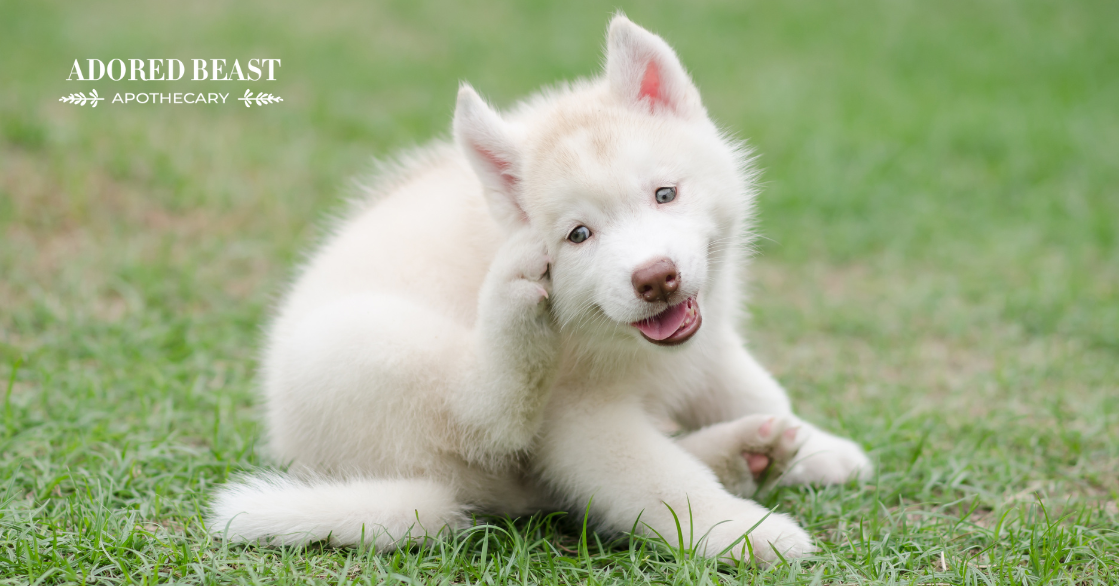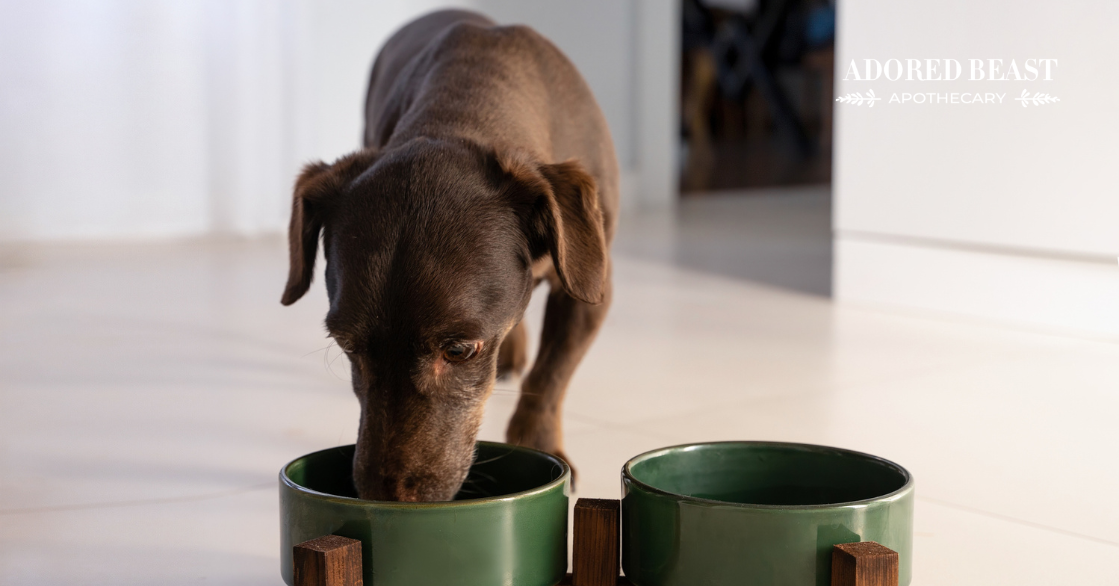Do you pay attention to your dog’s bathroom habits? People sometimes laugh at me because of my inspection of poop or the fact that, almost to a T, I can tell you when our dogs last went to the bathroom.
But this is important information. You can learn a lot about your dog’s health from their bowel movements.
Or, in this case, a lack thereof.
Just like it is for us, constipation in dogs can be a discomforting and potentially serious issue!
Recognizing the symptoms, understanding the underlying causes, and exploring holistic options for relief are essential. So, in this blog, we’ll delve into the signs of constipation, the various causes, and natural approaches to ease this common digestive concern.
Symptoms of Constipation in Dogs
It’s usually pretty easy to tell if your pup is “backed up”. Obviously, the first step is knowing about their habits and routines. Once you do, spotting any deviation from the norm is fairly easy.
What to watch out for:
- Changes to routine: Many dogs have a regular bowel routine and a normal pooping “frequency”. A change in that routine or a noticeable decrease in frequency can be a sign of constipation. Some dogs poop only once a day, while some dogs poop multiple times. If the “normal” amount decreases, that’s something you want to pay attention to.
- Straining: If your dog appears to be having difficulty passing stools, is visibly straining, or assumes a hunched posture, it may indicate constipation. Things should slide out easily, and the job should never cause your dog to strain or cry.
- Dry or hard stools: Poop shouldn’t be hard as a rock or dry as a bone. Constipated dogs may produce dry, firm, or pebble-like stools.
- Lack of interest in eating: Constipation can lead to a loss of appetite or decreased interest in food. When things are “full” inside the body, your dog may not see food in the same anticipatory or exciting light.
- Vomiting: In severe cases, constipation may cause vomiting as the digestive system struggles to move stool through. This is a really important sign to watch for as it can be a sign of a blockage somewhere in the digestive tract – and that’s an immediate concern.
What Causes the Backup?
There are several different things that can cause a backlog in the digestive tract – some more serious than others. These are some of the most common ones:
1. Diet
Your pup’s diet should lend itself well to smooth movement. However, sometimes things like inadequate fibre intake or sudden changes in the diet can contribute to constipation. Consider what your dog ate/has been eating – could something in the diet be the culprit?
Too much bone in the diet can also cause constipation – it’s often why you’ll see hard or dry stools (these will have a white, chalky look to them).
2. Dumpster Diving
It’s also important to consider whether or not they got into something they shouldn’t have. Were they rooting through the garbage? Maybe they ate some spoiled food or other matter? Or were they eating another pet’s food or snacks, or even sifting through the litter box? These can all lead to constipation.
3. Ingesting Foreign Objects
Dogs, especially puppies, may consume items like bones, hair, or fabric, leading to blockages and constipation. When Indi was a puppy, she had an obsession with socks – we had to watch her like a hawk and socks were well guarded!
This cause is a serious one, as it can mean a blockage somewhere in the digestive tract. If you know your dog ate something they shouldn’t have, especially if vomiting is present, a call to your trusted veterinarian is warranted. They can talk you though next steps.
4. Dehydration
If your pup isn’t drinking enough water, this can result in dry, hard stools that are difficult to pass.
How much water should a dog drink? Well, that’s a complex question, and it honestly depends on the individual dog as well as many other factors (existing disease states, activity, temperature, etc.). If you notice the bowl isn’t emptying as often as is typical, that could be the root of the constipation. In this case, you want to explore the causes for this decreased water consumption to make sure it’s not related to a connected medical issue. Speak with your trusted veterinarian if you suspect that to be the case.
5. Lack of Exercise
Movement encourages movement. Regular physical activity helps stimulate bowel movements, and a sedentary lifestyle may contribute to constipation.
6. Stress
Stress can impact so much when it comes to health, and your dog’s bathroom schedule is no exception.
Environmental changes, anxiety, or stress can all impact bowel movements. Has something changed in your animal’s life recently? Are they stressed about something in particular? These are things to consider if you notice the signs.
7. Medications
Just as with us, certain medications, such as painkillers or antihistamines, may cause constipation as a side effect. If you’re noticing your pup is off their routine while on a prescription, perhaps speak to the vet who prescribed them to get their advice on what to do.
Natural Options for Constipation in Dogs
The approach you take to constipation will obviously depend on the cause, if you can determine what that is.
- Ensure your dog has access to fresh, clean water at all times to prevent dehydration.
- Add fibre-rich, moisture-rich foods to your dog’s diet, such as pumpkin (canned, plain), sweet potatoes, or leafy green vegetables. These can promote regular bowel movements.
- Probiotic supplements can help maintain a healthy balance of gut bacteria, aiding in digestion.
- If the poop is hard, white, or crumbly, and your dog has had an abundance of bone lately, perhaps cut back a bit or leave it out for a period of time.
- Ensure your dog engages in regular physical activity to stimulate digestive processes.
- Herbs like marshmallow root or slippery elm may be helpful in supporting the smooth muscle of the bowel and having a demulcent effect in the digestive tract.
**Important: If you have any concerns about a blockage, or the constipation persists despite your intervention, contact your trusted veterinarian for additional support.
Paying attention to bathroom routines is crucial for identifying and addressing constipation in dogs. Many pet parents will openly admit to checking out droppings all the time! And that’s great – we want to know all we can about our animals’ health. So, keep an eye out. If you notice a change, think about what you can do, naturally, to get things moving again! And remember that for most dogs constipation will be an infrequent concern that can be kept under control with a species-appropriate while food diet, access to clean fresh water, and regular exercise.












